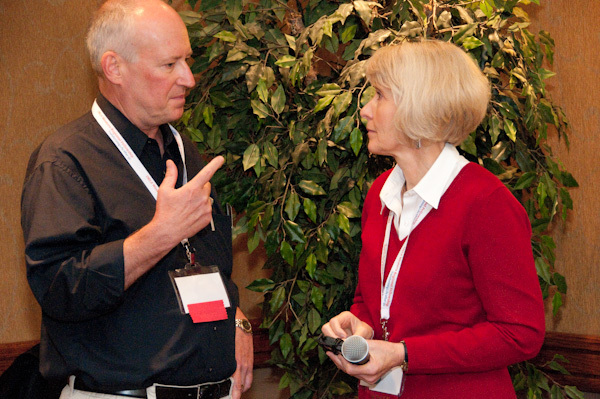Transforming Life After 50
 Photo: From TLA50 Institute in Portland, OR: Stephen Ristau and Suzanne Flint, TLA50 coordinators
Photo: From TLA50 Institute in Portland, OR: Stephen Ristau and Suzanne Flint, TLA50 coordinators
from Ning Community website: http://tla50resource.ning.com/
- Nearly 2/3 of all the human beings who have ever lived past the age of 65 are alive today.
- Often considered the wealthiest generation in American history, Boomers face unique financial challenges – including the lowest savings rate (10%) of any other generation, the uncertainty of Social Security and skyrocketing healthcare costs.
- Midlife is a period in which individuals begin to think about, plan for, and actually disengage from their primary occupations and the raising of children. They launch a second or third career, develop new identities and new ways to be productively engaged.
- Four out of five Boomers see work as playing a role in their retirement.
- In a 10-year longevity study, researchers concluded that close family relationships, although important, were less likely than a network of good friends to increase longevity in older people.
These are just a few facts that staff from Washington libraries have been learning this past year. Transforming Life after 50 (TLA50), an initiative that began in California, is taking over Washington libraries. From the largest library systems (King County Library System, Seattle Public Library) to the tiniest libraries (Odessa, Neill Public), enhancing services and programs for mid-life adults has become a focus thanks to 18 Washington fellows participating in a year-long fellowship.
Ninety-one Fellows from eleven states are participating in the year-long IMLS Western Regional Fellowship — an initiative to help transform library strategies, policies and practices to better support the needs and interests of midlife adults, ages 50+. Fellows were introduced to a new framework for serving and engaging these midlife adults at an in-person training institute in Portland, Oregon in September 2010.
In Portland, Fellows heard from guest presenters including Laura Carstensen, Paul Nussbaum, Michael Zielenziger and Robert Atchely. Furthermore, Fellows had the opportunity to meet each other and the instructors for the online portion of the fellowship. May is the final month of the live courses with a wrap up webinar scheduled for June. The online courses will be available to Fellows for a few months for those who need to catch up or wish to revisit previous courses.
In addition to the Fellowship, Washington Fellows have been spreading the word about TLA50 by presenting at the Washington Library Association conference in Yakima. More opportunities to share the TLA50 experience are coming soon with PNLA (Pacific Northwest Library Association) conference in August and WALE (Washington Library Employees) conference in October.
The Fellowship has focused on several areas of programming and services. At the Institute, presentations included the following topics:
- Community
- Financial Security
- Health (and aging)
- Life After 50 Options
- Lifelong Learning
- Spirituality
- Work & Volunteerism
The online courses have built on this foundation with courses on:
- Strategic Facilitation
- Community Assessment
- Partnerships and Collaborations
- Volunteer Engagement
- Evaluating Results
- Engaging Adults through Social Media
As we’ve learned how to engage mid-life adults in the library and community, we have also learned how important the changes brought about by the “Boomer” generation are to all of us today.
For a video peek at TLA50, visit http://tla50resource.ning.com/video/transforming-life-after-50-an
Also, consider joining the Transforming Life after 50 Ning community online: http://tla50resource.ning.com/ which is open to anyone interested in enhancing services and programming for the over 50 population in the library.
One final fact (that speaks for itself):
- 11% of the world’s population is over 60. By 2050, 22% will be.
*Quotes from the TLA50 website, http://transforminglifeafter50.org/.